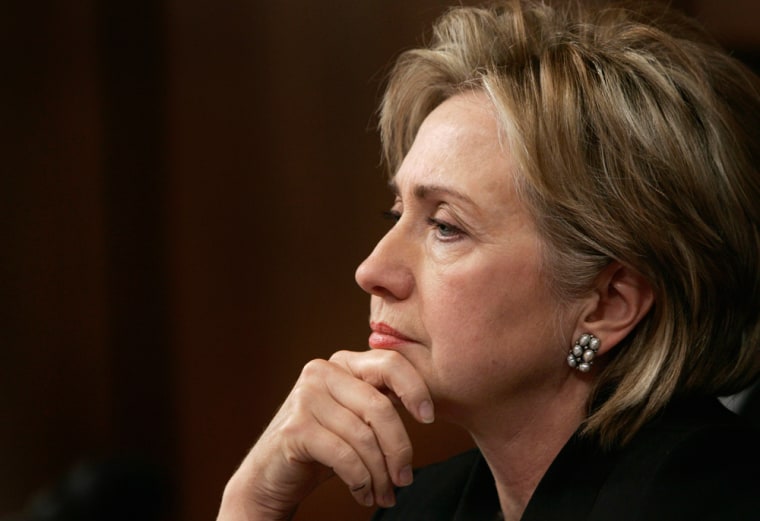Sen. Hillary Rodham Clinton (D-N.Y.) is taking a series of concrete steps toward a likely campaign for president in 2008, settling on key members of her campaign team, recruiting potential new additions to her staff, and calling Democratic activists in states with early primaries and caucuses.
No final decision on running is expected before the end of the year, according to sources knowledgeable about her thinking, as Clinton works methodically through a checklist of preparatory steps. But she and her inner circle are already ramping up for what could be a history-making bid for the White House.
The latest move is the choice of longtime adviser Patti Solis Doyle as campaign manager. That follows the recent recruitment of three seasoned political operatives who, if she runs, would play key roles on what is now a rapidly expanding Clinton campaign organization.
The three are Jonathan Mantz, who has been working for New Jersey Gov. Jon S. Corzine (D), as finance director; Phil Singer, who was communications director for the Democratic Senatorial Campaign Committee, as a communications strategist; and Karen Hicks, who ran former Vermont governor Howard Dean's New Hampshire operation in 2004, to oversee organizing, particularly in the early states.
Clinton is operating on a model she used before she decided to run for the Senate in 2000. "If you want to understand the process she is going through now, you need only look at the process she went through in 1999," said Clinton spokesman Howard Wolfson. "In that race, she reached out to elected officials, to potential donors [and] to policy experts and had lengthy serious meetings about whether she should run, the issues before the country, [and] what a campaign would look like."
Reaching out
In this case, her first step was to secure her New York political base, reaching out to the state's elected officials, including Gov.-elect Eliot L. Spitzer, labor leaders and prominent African Americans and Hispanics. Most of that activity took place last week.
This week's schedule includes phone calls to Iowa, New Hampshire, Nevada and South Carolina, the four states with the earliest contests in 2008. Other prospective candidates have made numerous trips to the early states, but Clinton avoided such travel during her reelection campaign this year -- even forbidding her advisers to begin discussions around the country on a possible campaign.
"She's obviously very knowledgeable already," said JoDee Winterhof, a former chief of staff of Iowa Sen. Tom Harkin (D), who spoke with Clinton yesterday. "We had a good talk about how to run a campaign there. . . . She understands that this will take a significant amount of hard work and campaigning and getting to know Iowans more up close and personal."
Aides expect that, in addition to the phone calls, Clinton will hold a series of meetings in Washington with state activists and others as she nears a final decision. This morning she is scheduled to have breakfast with Harkin in Washington. Harkin is publicly committed to supporting the candidacy of Iowa Gov. Tom Vilsack (D), but he said he and other Democrats in the state want the process there to be "fair and open."
Clinton has also spoken with former senator Bob Kerrey (D-Neb.), who ran against her husband, Bill Clinton, for the Democratic nomination in 1992. Kerrey is now president of the New School, a university in New York. He would not discuss the nature of that conversation.
Some Clinton advisers view the activities of other prospective Democratic candidates, particularly the mushrooming interest around Illinois Sen. Barack Obama, as a spur to the New York senator to accelerate her timetable. Others say she will not be hurried into a decision until she has completed her soundings and preparations. "She's going to do this at her own pace, and what anyone else does is not going to affect her decision-making," said Lorraine Voles, her Senate communications director.
But her presidential campaign preparations will be done on a far more compressed timetable than her decision to run for the Senate, made when she was first lady and living in the White House.
"It was a much longer process in 1999," said one Democratic strategist. "There she was not at all sure-of-foot politically. She had the carpetbagger aspect to deal with. She had no understanding of the intricacies of New York politics. So it took her a much longer time. Here there's not the luxury of a lot of time. This is a very fast-moving situation."
Early challenges: Staff, fundraising
Clinton advisers also recognize that they must move swiftly to recruit new staff members, in part because of competition from other candidates for operatives to manage key states, to fill communications assignments and to provide the support and assistance necessary to manage an enterprise the size of a presidential campaign. This "talent primary" is seen by her advisers as critically important to her success.
The second early challenge is fundraising. Clinton spent much of the past two years using her Senate reelection campaign to build a national fundraising infrastructure to support such a candidacy. Through mid-October, Clinton had spent $36 million on her reelection race, which she went on to win with 67 percent of the vote. A large portion of those expenditures went into an extensive direct-mail program aimed at beefing up Clinton's small-dollar donor lists.
Clinton advisers are also beginning to prepare for her first travels to states such as Iowa and New Hampshire as a prospective candidate, although there is no timetable for such appearances.
Jerry Crawford, a prominent Iowa Democrat and Vilsack supporter, said yesterday that he and Clinton traded voice-mail messages during the past two days. He said that she and her staff have been "very respectful" toward Vilsack and his candidacy. But he added: "It's clear she's looking to come to Iowa, and it seems clear she's giving serious consideration competing in Iowa."
